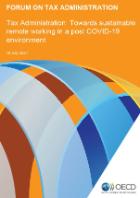Tax Administration: Towards Sustainable Remote Working in a Post-COVID-19 Environment
|
|
Published 19 July 2021
Access the document |
About
The COVID-19 pandemic saw a significant shift among most tax administrations to remote working by many of their staff. As tax administrations consider the shape of the workplace post-pandemic, many are examining the options for some degree of continued remote working for employees on a longer-term basis. Such a shift needs careful consideration as it touches many aspects of an organisation, from information technology through to employment policy and organisational culture. This note explore some of the key issues that tax administrations may wish to consider in designing remote working policies, processes and guidance to help ensure that longer-term remote working is sustainable for both the tax administration as a whole as well as individual employees. This note does not provide recommendations for particular measures as the circumstances of each administration will vary. Instead, the intention is that the information in this note will help to stimulate thinking in tax administrations as to where changes or additions to existing strategies could be needed, which is brought to life through examples of actions taken or planned by Forum on Tax Administration members.
About Risk Exposure and Tolerance Assessment Tool (RETA Tool)
This RETA tool has been created to help tax administrations explore how the risks associated with a move to longer term remote working have evolved over the pandemic. It assists in the identification of priority areas, and also provides a framework to help consider mitigation strategies. It is based on the Risk Exposure and Tolerance Assessment tool created by the Canada Revenue Agency. It is highly adaptable, and whilst it has been pre-populated with some suggested risks, these can be changed depending on the specific situation in each tax administration. More detail on the operation of the tool can be found in the ‘Read me’ tab contained within the tool.
Other actions to tackle Covid-19
With tax playing an important role in the response to the coronavirus (COVID-19) pandemic, the OECD has outlined a range of tax measures governments could adopt to curb the economic fallout of the crisis, and has developed a compilation of all tax measures taken by governments so far.
Tax administration
- Tax Administration Responses to COVID-19: Administrative measures to facilitate withholding tax relief claims (reference document, PDF, webbook), published 6 September 2021
- Tax Administration: Towards Sustainable Remote Working in a Post-COVID-19 Environment (reference document, PDF, webbook), published 19 July 2021
- Tax Administration: Digital Resilience in the COVID-19 Environment (reference document, PDF), published 21 April 2021
- Tax Administration Responses to COVID-19: Assisting Wider Government (reference document, PDF), published 30 July 2020
- Tax Administration: Privacy, Disclosure and Fraud Risks Related to COVID-19 (reference document, PDF), published 26 May 2020
- Tax Administration Responses to COVID-19: Measures Taken to Support Taxpayers (reference document, PDF), updated 21 April 2020
- Tax Administration Responses to COVID-19: Business Continuity Considerations (reference document, PDF), updated 7 April 2020
- Tax Administration Responses to COVID-19: Recovery Period Planning (reference document, PDF), published 26 May 2020
See latest tax policy, tax treaty and transfer pricing measures.
The OECD is compiling data, information, analysis and recommendations regarding the health, economic, financial and societal challenges posed by the impact of coronavirus (COVID-19). Please visit the dedicated OECD website for a full suite of coronavirus-related information.
Related Documents


